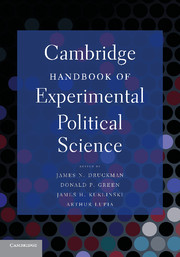84 results
The Logic of the Survey Experiment Reexamined
-
- Journal:
- Political Analysis / Volume 15 / Issue 1 / Winter 2007
- Published online by Cambridge University Press:
- 04 January 2017, pp. 1-20
-
- Article
- Export citation
PART II - THE DEVELOPMENT OF EXPERIMENTS IN POLITICAL SCIENCE
-
- Book:
- Cambridge Handbook of Experimental Political Science
- Published online:
- 05 June 2012
- Print publication:
- 06 June 2011, pp 71-72
-
- Chapter
- Export citation
List of Tables
-
- Book:
- Cambridge Handbook of Experimental Political Science
- Published online:
- 05 June 2012
- Print publication:
- 06 June 2011, pp viii-viii
-
- Chapter
- Export citation

Cambridge Handbook of Experimental Political Science
-
- Published online:
- 05 June 2012
- Print publication:
- 06 June 2011
Frontmatter
-
- Book:
- Cambridge Handbook of Experimental Political Science
- Published online:
- 05 June 2012
- Print publication:
- 06 June 2011, pp i-iv
-
- Chapter
- Export citation
AFTERWORD
-
- Book:
- Cambridge Handbook of Experimental Political Science
- Published online:
- 05 June 2012
- Print publication:
- 06 June 2011, pp 523-524
-
- Chapter
- Export citation
2 - Experiments
-
-
- Book:
- Cambridge Handbook of Experimental Political Science
- Published online:
- 05 June 2012
- Print publication:
- 06 June 2011, pp 15-26
-
- Chapter
- Export citation
Contributors
-
- Book:
- Cambridge Handbook of Experimental Political Science
- Published online:
- 05 June 2012
- Print publication:
- 06 June 2011, pp xi-xii
-
- Chapter
- Export citation
PART IX - ADVANCED EXPERIMENTAL METHODS
-
- Book:
- Cambridge Handbook of Experimental Political Science
- Published online:
- 05 June 2012
- Print publication:
- 06 June 2011, pp 443-444
-
- Chapter
- Export citation
Subject Index
-
- Book:
- Cambridge Handbook of Experimental Political Science
- Published online:
- 05 June 2012
- Print publication:
- 06 June 2011, pp 548-562
-
- Chapter
- Export citation
31 - Treatment Effects
-
-
- Book:
- Cambridge Handbook of Experimental Political Science
- Published online:
- 05 June 2012
- Print publication:
- 06 June 2011, pp 445-458
-
- Chapter
- Export citation
1 - Experimentation in Political Science
-
-
- Book:
- Cambridge Handbook of Experimental Political Science
- Published online:
- 05 June 2012
- Print publication:
- 06 June 2011, pp 3-12
-
- Chapter
- Export citation
Name Index
-
- Book:
- Cambridge Handbook of Experimental Political Science
- Published online:
- 05 June 2012
- Print publication:
- 06 June 2011, pp 531-547
-
- Chapter
- Export citation
PART VI - IDENTITY, ETHNICITY, AND POLITICS
-
- Book:
- Cambridge Handbook of Experimental Political Science
- Published online:
- 05 June 2012
- Print publication:
- 06 June 2011, pp 287-288
-
- Chapter
- Export citation
PART VII - INSTITUTIONS AND BEHAVIOR
-
- Book:
- Cambridge Handbook of Experimental Political Science
- Published online:
- 05 June 2012
- Print publication:
- 06 June 2011, pp 337-338
-
- Chapter
- Export citation
List of Figures
-
- Book:
- Cambridge Handbook of Experimental Political Science
- Published online:
- 05 June 2012
- Print publication:
- 06 June 2011, pp ix-x
-
- Chapter
- Export citation
Acknowledgments
-
- Book:
- Cambridge Handbook of Experimental Political Science
- Published online:
- 05 June 2012
- Print publication:
- 06 June 2011, pp xiii-xiv
-
- Chapter
- Export citation
PART III - DECISION MAKING
-
- Book:
- Cambridge Handbook of Experimental Political Science
- Published online:
- 05 June 2012
- Print publication:
- 06 June 2011, pp 139-140
-
- Chapter
- Export citation
INTRODUCTION
-
- Book:
- Cambridge Handbook of Experimental Political Science
- Published online:
- 05 June 2012
- Print publication:
- 06 June 2011, pp 1-2
-
- Chapter
- Export citation
PART V - INTERPERSONAL RELATIONS
-
- Book:
- Cambridge Handbook of Experimental Political Science
- Published online:
- 05 June 2012
- Print publication:
- 06 June 2011, pp 241-242
-
- Chapter
- Export citation



